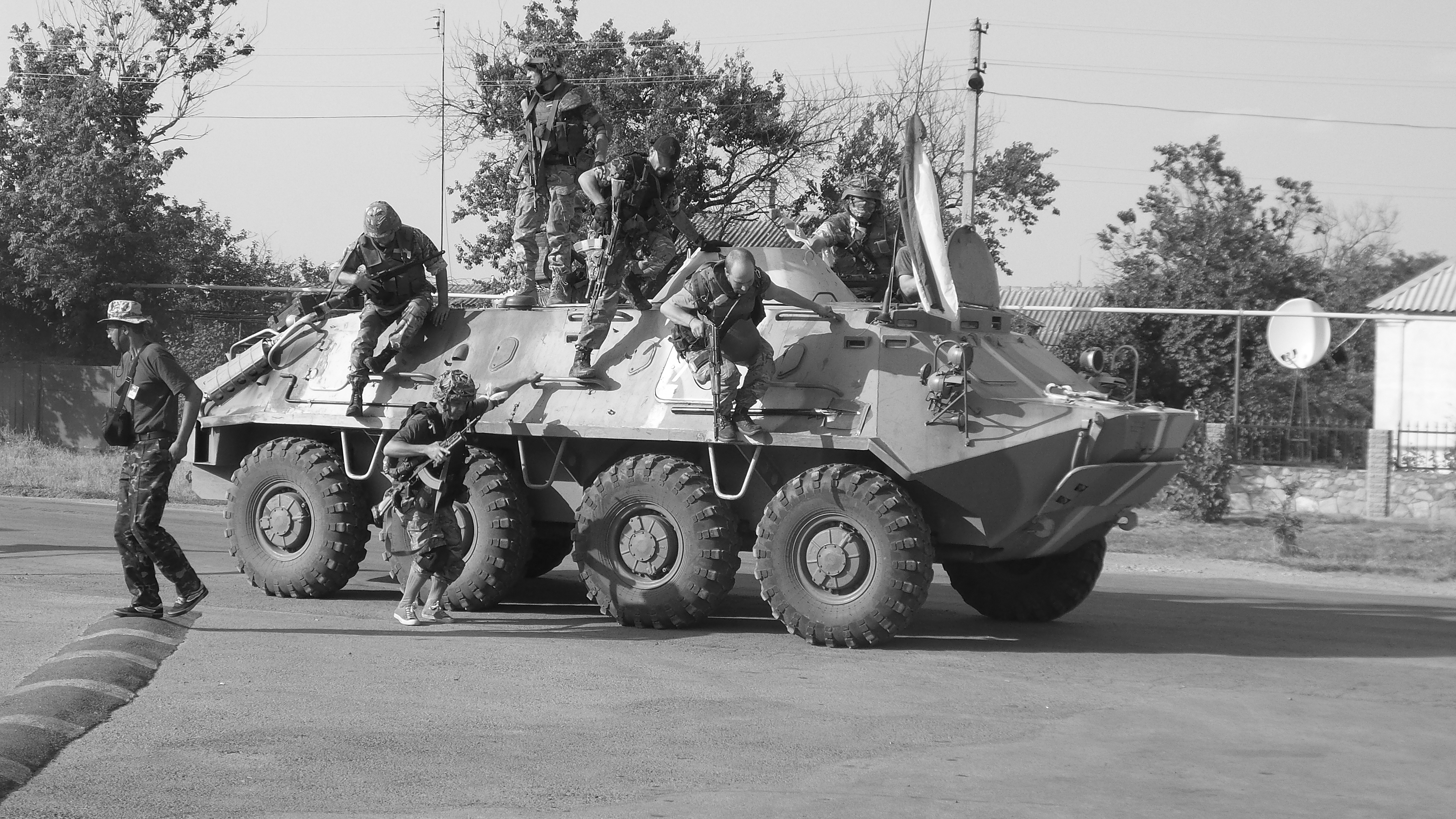By Mykola Kapitonenko | Kiev
In the pre-election rhetoric used by all the front-runners in Ukraine’s presidential campaign, issues of national security and foreign policy ranked high. The conflict – referred to by many as ‘war’ – with Russia, the question of annexed Crimea, aspirations for NATO and EU membership, became topics of specific concern and points for emotional political discussions. The overwhelming majority of presidential candidates – there were 39 on the list in total – highlighted the restoration of the country’s territorial integrity and moving closer to EU and NATO membership as their foreign and national security policy priorities.
However, promises by Ukrainian politicians are generally misleading or unspecified. Most of them do not make up a unified plan; they rather indicate an approximate direction or outline the future rhetoric. In most cases, a better way to balance expectations may lie in referring to the candidates’ previous political experiences.
But Volodymyr Zelensky, who has won the elections with an overwhelming 73% of votes, is a newcomer. Without prior political experience and with very few messages on foreign policy, so far he has raised too many questions about what kind of Ukraine the world will have to deal with. Unlike Petro Poroshenko, Viktor Yanukovych or Yulia Tymoshenko – Ukraine’s recent political heavyweights – he has neither given an interview, nor written an article presenting a coherent outlook on regional security, bilateral relations or global security issues.
At this point, his future foreign policy looks quite mysterious. But this mystery can be partly uncovered.
Donbas and Russia
Dealing with the conflict in Donbas will be a major challenge for President Zelensky. The fighting has been going on for five years, since Russia-backed separatists created the ‘Donetsk and Luhansk People’s Republics’ in the east of Ukraine. With over fifteen thousand casualties and over 2 million IDPs, the conflict is far from being resolved. The Minsk agreements of 2014 and 2015 provided a framework for conflict management, but have never been implemented properly.
Attempts to resolve the conflict with the assistance of a UN peacekeeping mission have largely failed due to differences between Russia and Ukraine: while the former wants peacekeepers just along the contact line, the latter supports their deployment over the whole territory of the conflict.
A firm political deadlock is in place, and daily artillery shelling keep the conflict away from settlement.
Restoring peace was a central element of candidate Zelensky’s campaign, although it was mentioned on several occasions that Ukraine should not abandon its territories and citizens. Most likely the new president will be bound by the Minsk agreements and continue to operate within Normandy format. He seems to be more open to direct negotiations with Russia, although a possible area of agreement still seems to be absent.
A couple of ideas have been put forward during the campaign: broadening the Normandy format by inviting the US and UK; and insisting on commitments under the Budapest Memorandum of 1994. However, so far both seem far from practical implementation. The Budapest Memorandum, which Ukraine has often referred to recently, is clearly insufficient to resolve the problem created by the Russian annexation of Crimea.
The Memorandum was commonly raised in the election campaign, but the document seems to be inoperable under the current international circumstances. It would also be hard to expand the Normandy format. For various reasons, the US and UK have been avoiding direct engagement in managing the conflict in eastern Ukraine; and it seems unlikely that the Ukrainian government will find any arguments to modify their position.
Recently it might have seemed that the conflict in its current state was quite acceptable for both Moscow and Kyiv. The positions of the spoilers in both countries looked strong, and substantial initiatives to resolve the conflict were lacking.
On the one hand, marginalising the spoilers could have brought new life into the negotiation process, although any compromises would still have been hard to reach. On the other hand, the conflict has lasted long enough to become institutionalised and generate its own historic memory – and has thus become much more difficult to resolve.
President Zelensky will find himself in a very challenging position regarding the implementation of any strategy to resolve the conflict.
Bound by public opinion and facing strong internal opposition, it will be difficult for him to take radical steps or new initiatives. Because of this, the most likely scenario seems to be the continuation of the current deadlock.
Poland, Hungary, and regional security
Another priority for the new Ukrainian president could be to restore good relations with the country’s Western neighbours and enhance regional security. The regional dimension has always been important for Ukraine, especially today, when regional security institutions have been significantly damaged by Russian revisionism.
Geopolitical clashes between the superpowers over Eastern Europe are escalating; questions of energy security are receiving more attention; the Eastern Partnership initiative is obviously not working properly.
The region is witnessing a rise of nationalism and the retreat of democracy – a combination which is only detrimental to stability and security. Ukraine is part of these developments, and has to make a contribution towards restoring the security architecture in the region.
This task will also be of crucial importance for the new president.
Rumours that President Zelensky may pay a visit to Warsaw underscore the importance of getting back to a true strategic partnership with Poland. This partnership, although geopolitically important as ever, has recently been significantly damaged by clashes over history.
In April 2015 the Ukrainian Parliament adopted the so-called ‘decommunisation laws’, which sanction anyone who denies the heroic nature of those who fought for Ukraine. This step has been received negatively by Warsaw, an effect multiplied as the laws were adopted on the same day when the President of Poland gave a speech in the Ukrainian Parliament stressing that Poland wants good relations with Ukraine.
In 2016 the Polish parliament unanimously adopted a resolution which qualifies the Volhynia killings as genocide of the Polish people. In 2017 Ukraine banned Poland’s exhumation works on its territory in response to the deconstruction of a monument to the UPA (Ukrayinska Povstanska Armiya) in Hruszowice, Poland.
In 2018 the Polish parliament adopted amendments to a bill prepared by the Polish Institute of National Remembrance placing criminal liability for the denial of ‘crimes by Ukrainian nationalists’ between 1925 and 1950, although these were struck down by Poland’s Constitutional Court in 2019. Focusing on pragmatic issues and making concessions over history whenever possible could be a good starting point for improving bilateral relations.
Ukraine’s conflict with Hungary over language issues is also mutually damaging.
Current relations between Ukraine and Hungary are a textbook example of a crisis in which neither party considers actions to be acceptable, while both overestimate their capabilities and underestimate the potential risks and losses.
The conflict was triggered by the new Law on Education adopted by the Ukrainian parliament in September 2017.
The Hungarian reaction, which initially concerned the protection of the rights of its minority on the territory of Ukraine to receive education in the Hungarian language, quickly spread to questions of Ukraine’s Euro-Atlantic integration, citizenship and political cooperation.
As in the Polish case, Ukraine’s relations with Hungary are affected by both regional developments and the efforts to construct a national identity recently undertaken by the Ukrainian government.
Zelensky has built his campaign largely on a contrast to his predecessor President Poroshenko’s line of symbolic nationalism, which was deeply rooted in history, language, and religion. This new approach opens a window of opportunity to restore good relations with Warsaw and Budapest and thus improve the regional context of Ukraine’s national security.
EU and NATO as strategic objectives
On 7 February this year, the Ukrainian parliament adopted constitutional amendments, in accordance to which membership of the EU and NATO were formally stated as the strategic course of Ukrainian foreign policy. This step is seen by many as a part of the campaign by then-President Poroshenko, who was actively advocating such changes to the legislature.
To a certain extent, this decision by the Parliament was the ideal coda for Ukraine’s policies towards NATO and the EU in recent years: lots of declarations with few tangible results.
The ousting of President Yanukovych is often referred to as the ‘Euromaidan’, implying that the initial protests started after the government refused to sign the Association Agreement with the EU, which had been negotiated after 21 rounds of talks.
Although the agenda of the mass protests in Kyiv in 2013-2014 significantly broadened almost immediately, the reference to European values remained the key ideological driver. Consequently, aspirations for EU membership played an exceptionally important role in the foreign policy of Poroshenko’s administration.
Following the annexation of Crimea by Russia and the breakout of the conflict in the Donbas, membership in NATO joined the official agenda as the country’s top priority. Although neither EU nor NATO membership has ever been within reach for Ukraine, the European and Euroatlantic integration of the country has been claimed as major markers of its foreign policy.
However, despite the government’s rhetoric the country today arguably finds itself more distant from membership of either the EU or NATO than it did a decade ago. At the NATO Summit in Bucharest in 2008 Ukraine was denied a Membership Action Plan due to the position of Germany and France, although the US had strongly advocated in favour.
Today, there appear to be many more opponents among NATO member states of the same plan for Ukraine. It also looks like the format of cooperation with the EU has been set by the Association Agreement, and it will take a long time for Ukraine to reach the targets set by this partnership.
This means that for years to come, any realistic agenda of the country’s relations with both the EU and NATO will be quite different from the picture painted by the Ukrainian Parliament in February. Finding ways to bridge this gap and concentrate on more realistic formats of cooperation will certainly be among the priorities for the new president of Ukraine.
While campaigning, Zelensky mentioned the possibility of holding a referendum on NATO membership. He also referred to movement towards NATO as a national security guarantee. At the same time, the ongoing unresolved conflict with Russia and the deficit of democracy in Ukraine will be main obstacles on the way to NATO membership.
Security and structural context
The world is changing. Traditional perceptions of international security and interactions among states are being modified. Institutions of multilateral cooperation and international law are losing efficiency, while the demand for hard power is rising.
States are less willing to trust each other and more often inclined to take international politics as a zero-sum game. Non-traditional threats are multiplied, while the traditional ones are becoming more pressing.
In the last five years Ukraine’s position in almost all the key issues has worsened, including the conflict with Russia, dialogue with Western partners, and relations with most of its neighbours.
None of its major foreign policy and national security problems have been resolved in that period: NATO membership is as distant as ever; European values are scarcely being implemented; any resolution of the conflict in Donbas has been blocked; Russia is in firm control over Crimea; foreign assistance has not been sufficient to overcome Ukraine’s systemic drawbacks. Ukraine has not become a story of success and democratic transformations. If the trend continues, Ukraine will firmly reside in the ‘grey zone’ of security in Europe for decades.
Ukraine’s foreign policy can only be successful after the institutional weakness of the state has been overcome, systemic reforms have been introduced, corruption has been reduced, and economic growth and standards of living improved. Another prerequisite for a successful foreign policy would be an adequate assessment of the country’s security environment, threats, challenges, and resources available to it.
The environment has significantly deteriorated and will likely remain unfavourable to Ukraine for some time. Russia’s violations of fundamental norms of international law and principles of international security have caused a deep crisis of trust and the erosion of the normative foundations of the international system.
Its use of military force against Ukraine, the occupation of parts of its territory, the violation of Budapest Memorandum’s provisions guaranteeing the territorial integrity of Ukraine, the violation of the Treaty on Friendship, Cooperation, and Partnership between Ukraine and the Russian Federation, have all generated new, much more dangerous conditions for Ukraine’s foreign policy.
Zero-sum games and worstcase scenarios are becoming commonplace in international politics, making weak states especially vulnerable.
Conclusion
Foreign and security policy will remain key areas of state policy for the whole of Volodymyr Zelensky’s presidency. These issues will demand additional attention, resources, initiatives, and responsibility.
Poroshenko’s policy was to a large extent declarative, based on slogans of waging war with Russia, moving towards Western institutions and restoring the territorial integrity of Ukraine.
Chances are high that the new president will stick to them as well. After all, foreign policy is always characterised by inertia and middle-ground decisions.
At the same time, a window of opportunity will open up in the next few months. President Zelensky may not be able to quickly overcome Russia’s pressure or take back control over Ukrainian territories, but he can set the agenda, define achievable priorities, improve decision-making and resolve the unnecessary conflicts in Ukraine’s neighbourhood.
With that accomplished, Ukraine may over time move to a much stronger position in dealing with its most important security challenges.
MYKOLA KAPITONENKO, PhD, is a co-editor-in-chief at UA: Ukraine Analytica and an Associate Professor at the Institute of International Relations of Kyiv National Taras Shevchenko University.





